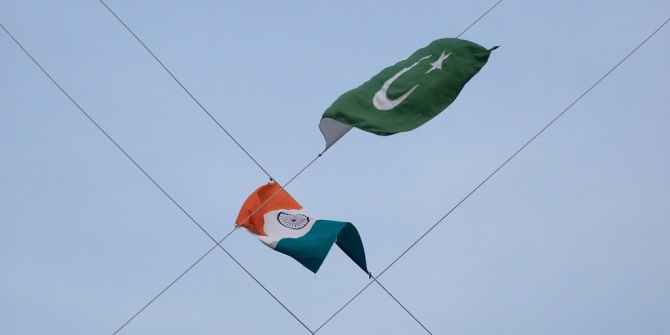 Political parties in India may have won landslide victories in elections, but should parties with unelected leaders be part of democratic politics? Mukulika Banerjee writes that even in the midst of the chaos following the vote in favour of Brexit, there are lessons for India in the Brits’ strict adherence to rule-books and due process, at least within both the main parties.
Political parties in India may have won landslide victories in elections, but should parties with unelected leaders be part of democratic politics? Mukulika Banerjee writes that even in the midst of the chaos following the vote in favour of Brexit, there are lessons for India in the Brits’ strict adherence to rule-books and due process, at least within both the main parties.
Today Britain will have a new prime minister, ending an extraordinary three weeks of national upheaval following the shock vote on June 23 to leave the European Union – ‘Brexit’.
Populists praise referendums as giving clear and direct expression to the ‘will of the people’, unmediated by the ‘elite’ or ‘self-serving’ parliamentary representatives. But many political scientists have long criticised referendums as a crude and dangerous way to gauge opinion on complex issues, their yes/no format stripping away all nuance, aggregating thousand types of discontent and protests, and crystallising new social divisions.
Britain should know this better than most. In July 1947, it forced the North West Frontier Province and Sylhet to choose between India and Pakistan. Those referendums gave the retreating colonial power what it needed – a tidy solution that divided people, language and economies, and kept the lines of partition neat. But it brought devastating effects for the people, who have had to live with the consequences to this day.
The British ignored the provincial governments who had offered more imaginative but messier solutions. The main, perhaps only, virtue of a referendum is the clear-cut results it gives. So nearly seventy years later, Britain has now had a taste of its own medicine: much to its surprise, and already to the regret even of many who voted for it, Brexit means Brexit.
The Brexit saga has not been Britain’s finest moment. David Cameron’s decision to call the referendum, to gamble the future stability and prosperity of the country and even the continent, merely to settle internal party tensions and fend off the far right, was reckless in the extreme and one for which half the country will never forgive him.
During the campaign, the exaggerations, cynicism, opportunism, lack of conviction and outright lies displayed by politicians on both sides of the debate was alarming. The result created uncertainty, fear and turmoil. On the streets, it unleashed bigotry and abuse that British norms of civility normally keep mostly at bay. In the markets the currency and shares plummeted. Cameron resigned and his old school chums soon betrayed one another as they fought to replace him. The Labour Party rapidly fractured between its ineffectual leader, mutinous MPs, restive left-wing membership and trade union masters. George Bernard Shaw once said elections were ‘a mud bath for every soul’ and so it has been, in spades.
And yet, amid all this grim chaos and dirty politics, the Brits sensibly clung on to the lifeline of rule-books and due process, at least within both the main parties.
For an observer of Indian politics, it was noteworthy that despite the severe split between Leave and Remain within the Conservative Party itself, there was never a shade of doubt that an intra-party two-stage election would take place to find the next leader and thus prime minister.
Overseen by the 1922 committee of backbenchers, any MP could stand. Amidst much drama of missed meetings, lost text messages and stabs in the back, five candidates emerged – three leavers, two remainers; three men, two women; three well established ministers, two less so. All conservative MPs voted. The candidate with the least votes was eliminated, but said he had raised the important issue of national security. Then the fourth placed, and youngest, withdrew voluntarily, having flagged his ambition for the future. A second round of MP voting eliminated a third, leaving only the two women.
These were to be presented to the 1,50,000 members of the Conservative Party (who had been members for at least three months) to decide between. However, after a series of gaffes in interviews and aspersions about the accuracy of her CV and tax affairs, one withdrew. Thus, Theresa May became the new leader of the Tories and prime minister of Britain on the basis of 200 MP votes. Rather than taking the two months that were predicted for the process, it was wrapped up in two weeks and hailed as a victory for the pragmatism and adaptability of the unwritten British constitution.
Meanwhile in the Labour camp, the two sides have also been closely examining the rule book. If the leader doesn’t resign and is challenged, is he automatically entered into the ballot of members? Or does he, like the challenger, first need 50 MPs to nominate him – which at the moment he would not get? The national executive has just said he can automatically stand. His opponents may issue a legal challenge to this.
The past few weeks in Britain confirmed what citizens the world over know – politics is by nature murky and seductive like quicksand. But that is also precisely why robust political institutions and procedures are needed, to keep the excesses in check. The turmoil of the past three weeks could thus be read as much as a triumph of democracy as its failure. A parliamentary democracy is after all not just a system of elections to choose the next set of dubious politicians to government. It is also a set of rules about representation, transparency and accountability of those who rule, and requires politicians to undergo a severe test within their own party membership if they wish to lead it. These internal elections need to be free and fair, and the chance to stand should be available to all. Such probity can be achieved when birth, dynasty, money and muscle power are made irrelevant, and the contest is scrupulously monitored so each member of the party can vote with confidence and without intimidation.
Observers of Indian politics need to raise these questions about political parties in India. Indian elections are (rightly) celebrated as free and fair but what about internal party democracy? When was the last time free and fair elections were held within political parties? India’s oldest political party and indeed in its most recent ones are obvious defaulters. The Congress, the Aam Aadmi Party, the Trinamool Congress and the AIADMK may have won landslide victories in elections, but should such parties with unelected leaders be part of democratic politics? Whatever may be said of Theresa May’s views, her credentials as the leader of the Conservative Party will have been impeccably acquired by the rule-book. Her performance as the next prime minister of Britain will of course be another story.
This article originally appeared in The Wire on 13 July 2016.
Image: DFID CC BY 2.0
Note: This article gives the views of the author, and not the position of the South Asia @ LSE blog, nor of the London School of Economics. Please read our comments policy before posting.
About the Author
 Mukulika Banerjee is Director of the South Asia Centre and Associate Professor of Anthropology at LSE.
Mukulika Banerjee is Director of the South Asia Centre and Associate Professor of Anthropology at LSE.








I was trying to work out what is the selection process of the leaders in the main political parties in India — left or right am not sure if they are chosen by subscribed party members, and some rule the party for decades without real tests for popularity. I find the dismantling of the Labour party in Britain, unthinkable as an example to ever work for India. In Britain, democracy works despite internal coups with a booed leader in the parliament propped up by an overwhelming popular support. However, there is more to this story — does anyone know that following the successful nomination of Corbyn’s leadership through the Labour Executive, local meetings have stopped, except the social hours. Labour members can be thrown out tutting, shaking their head, comments under their breaths, those made in anger that constitutes dismissive body language. Finger pointing to other members is considered sexist and aggressive. So for all that is praiseworthy democracy subscribing to the rule book, one can also say British democracy has shown the way to experimenting with truth.